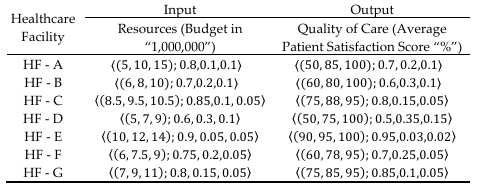Incorporating Neutrosophic Uncertainty in Data Envelopment Analysis
Keywords:
Data Envelopment Analysis; Neutrosophic Uncertainty; Efficiency Evaluation; Decision Making; Uncertainty Management; Healthcare Facility, OptimizationAbstract
In the realm of Data Envelopment Analysis (DEA), the assessment of relative
efficiency has historically relied on deterministic variables. Yet, real-world data often presents
diverse uncertainties, including a neutrosophic nature, which can significantly impact the
accuracy and reliability of DEA outcomes. Therefore, the current paper proposes a new DEA
model entirely to address this issue and in new DEA model designed to address this issue,
preexisting approaches that fall short due to the inability to address neutrosophic uncertainty,
which can be commonly found in actual data, to enhance efficiency evaluation precision. This
paper introduces the new DEA model to show the potential to deal with the neutrosophic
uncertainty in the input and output to decide whether the certain variable is deterministic or
neutrosophic. In addition, they assure the flexibility of the model regarding the orientation and
to embrace both the output-orientation and input-orientation as well as both constant and
variable return on scale. In its simplest form, the model converts the neutrosophic constraints
into their determinate forms, which makes the DEA issues feasible in the determinate domain.
On this way, the current model enhances the drawbacks of conventional DEA methodologies,
and the actual data reflected by neutrosophic indeterminacies. The research discusses that the
proposed model holds a high capability and flexibility through theoretical examination and
through the given cases. This particular methodology helps researchers and decision makers
to be able to use all its functions in enhancing defensibility and precision in the assessment of
efficiency thereby increasing the accuracy of the decision-making process in every aspect of its
use.
Downloads

Downloads
Published
Issue
Section
License
Copyright (c) 2024 Neutrosophic Sets and Systems

This work is licensed under a Creative Commons Attribution 4.0 International License.






